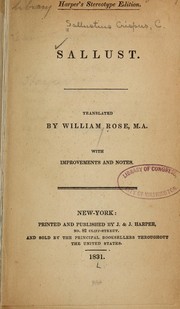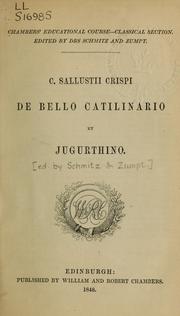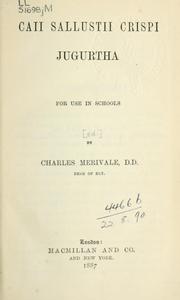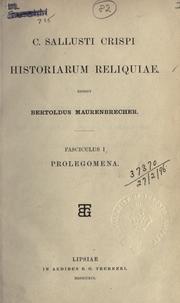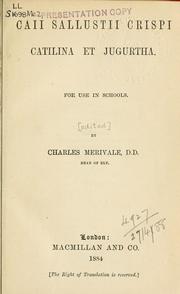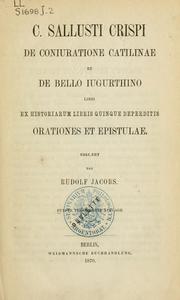Gaius Sallustius Crispus, generally known simply as Sallust, (86-34 BC), a Roman historian, belonged to a well-known plebeian family, and was born at Amiternum in the country of the Sabines. Throughout his career Sallust always stood by his principle as a popularis, an opposer of Pompey's party and the old aristocracy of Rome.
After an ill-spent youth, Sallust entered public life and won election as Quaestor in 55 and one of the tribunes of the people in 52, the year in which the followers of Milo killed Clodius in a street brawl. Sallust then supported the following prosecution of Milo. He also had hostilities with the famous orator Cicero.
From the beginning of his public career, Sallust operated as a decided partisan of Caesar, to whom he owed such political advancement as he attained. In 50 the censor Appius Claudius Pulcher removed him from the Senate on the grounds of gross immorality (probably really because of his friendship with Caesar). In the following year, no doubt through Caesar's influence, he was reinstated.
In 46 he served as a praetor and accompanied Caesar in his African campaign, which ended in the decisive defeat of the remains of the Pompeian war party at Thapsus. As a reward for his services, Sallust gained appointment as governor of the province of Africa Nova. In this capacity he committed such oppression and extortion that only the influence of Caesar enabled him to escape condemnation. On his return to Rome he purchased and began laying out in great splendour the famous gardens on the Quirinal known as the Horti Sallustiani or Gardens of Sallust. These gardens would later belong to the emperors.
Sallust then retired from public life and devoted himself to historical literature, and further developing his Gardens of Sallust, upon which he spent much of his accumulated wealth (Wikipedia).
735 works Add another?
 Most Editions
Most Editions
Most Editions
First Published
Most Recent
Top Rated
Reading Log
Trending
Random
-
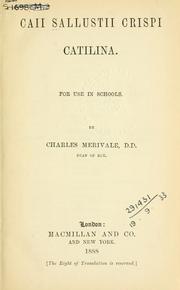
Preview Book
×Close
Subjects
History, Jugurthine War, 111-105 B.C., Jugurthine War, 111 B.C.-105 B.C., Early works to 1800, Latin language, Readers, Politics and government, Constitutional history, Translations into English, Jugurthine War, 111-105 B.C, Economic conditions, Rome, history, republic, 510-30 b.c., Sallust, 86 b.c.-34 b.c., Jugurthine war, 111-105 b.c., Latin language materials, Latin literature, Rome, history, Translations into Italian, Biography, Jugurthine War, 111-105 B. C., Catilina, lucius sergius, approximately 108 b.c.-62 b.c., Histoire, Historiography, History, ancient, Jugurthine war, 111-105 b.cPeople
Catiline (ca. 108-62 B.C), Catiline (approximately 108 B.C.-62 B.C), Sallust (86-34 B.C), Sallust (86 B.C.-34 B.C), Jugurtha King of Numidia (approximately 160 B.C.-104 B.C), Marcus Tullius Cicero, Catiline, Jugurtha King of Numidia (ca. 160-104 B.C), Arrian, Cataline (ca. 108-62 B.C), Catilina, Catiline (108-62 B.C), Cornelius Tacitus, Daniel Crespin (1640-1716,), Gaius Marius (ca. 157-86 B.C), Iugurtha, Lucius Annaeus Florus, Lucius Sergius Catilina (108 8ca.)-62 B. C), Lucius Sergius Catilina (c. 106-62 B.C), Lucius Sergius, C. 108-62 B. C. Catalina, Ludovico Carbone (1430?-1485?), Plutarch, Sallust, Samuel Johnson (1709-1784), TrevisaniTime
Conspiracy of Catiline, 65-62 B.C., Conspiracy of Catiline, 65 B.C.-62 B.C., Republic, 265-30 B.C., Conspiracy of Catiline, 65-62 B.C, Republic, 265 B.C.-30 B.C., Conspiracy of Catiline, 65-62 BC, 265 B.C.-30 B.C., 265-30 B.C., 53 B.C.-44 B.C., 65-62 av. J.-C. (Conjuration de Catilina), B.C. 65-62 (Conspiracy of Catiline), Conspiracy of Cataline, 65-62 B.B., Conspiracy of Catilina, 65-62 B.C., Republic 265-30 B.C., Republic, 265-30 B.C, Republic, 510 B.C.-30 B.C., Republic, 510-30 B.C., To 1500ID Numbers
- OLID: OL6824884A
- ISNI: 0000000121462501
- Library of Congress Names: n79018348
- LibriVox: 5262
- Project Gutenberg: 2455
- SBN/ICCU (National Library Service of Italy): CFIV002500
- VIAF: 104162705
- Wikidata: Q7170
- Inventaire.io: wd:Q7170
Links outside Open Library
Alternative names
- Caius Sallustius Crispus
- C. Sallustius Crispus
- Sallustius
- Salluste
- Sallust
- Gaius Sallustius Crispus
- Sallust.
- 86-34 B.C Sallust
- Salustio
- Sallustii Caius Crispi
- Sallust's
- Crispus C. Sallustius
- Salluste, Jules César, Velleius Paterculus, Lucius Annaeus Florus
- Caius Sallustii Crispi (Sallust)
- Caius Sallustii Crispi
- Cayo Salustio Crispo
- Sallustius, Crispus, C.
- C . Sallustius Crispus
- Salust
- C. Sallusti Crispi
- Sallust 86-34 B.C
- Sallust 86 B C
- Gaius Sallustius Crispus Sallust
- 86-34 B. C Sallust
- Sallust 86-34 B C
- 86-34 B. C. Catilina Sallust
- 86-34 B. C. Jugurtha Sallust
- 86 B. C. -34 B. C. Sallust
- 86 B. C. -34 B. C. Bellum Catil Sallust
- Gaius Crispus Sallustius
| August 1, 2025 | Edited by WikidataBot | [sync_author_identifiers_with_wikidata] add wikidata remote identifiers |
| August 12, 2024 | Edited by Tom Morris | merge authors |
| August 12, 2024 | Edited by Tom Morris | merge authors |
| September 27, 2020 | Edited by MARC Bot | add ISNI |
| August 30, 2010 | Created by ImportBot | new author |




